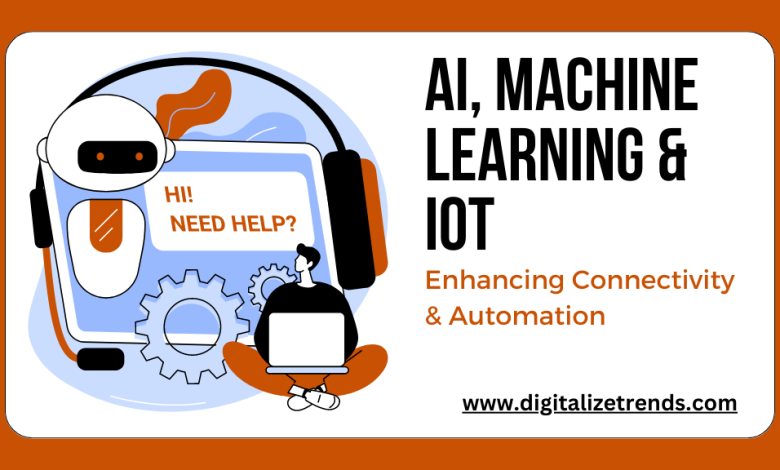AI, Machine Learning & IoT: Enhancing Connectivity & Automation
Role of AI, Machine Learning & IoT

Introduction
The Internet of Things (IoT) is a rapidly developing technology that enables smart devices to connect and communicate with each other over the internet. This technology has the potential to revolutionize various industries, including healthcare, manufacturing, transportation, and agriculture. The integration of Artificial Intelligence (AI) and Machine Learning (ML) with IoT can significantly enhance its capabilities and enable it to make more informed decisions based on real-time data analysis.
IoT devices generate vast amounts of data, and businesses are always looking for ways to extract value from this data. This is where machine learning (ML) and artificial intelligence (AI) come in. AI and ML algorithms enable robots to learn from data, identify patterns, and make informed decisions without human intervention. By using AI/ML to analyze the data produced by IoT devices, organizations can gain valuable insights, automate decision-making processes, and optimize their operations.
The use of AI and ML in IoT has significant benefits for businesses. Organizations can reduce energy consumption and costs by analyzing data collected from IoT sensors. AI/ML algorithms can automate anomaly detection, identifying unusual patterns in the data produced by IoT devices. Predictive maintenance is another area where AI/ML can benefit businesses by predicting when machines will need maintenance, reducing downtime and cutting costs.
Overall, the integration of AI/ML with IoT can enhance operational effectiveness, cut costs, and open up new revenue streams for businesses. By using these technologies to make sense of the vast amounts of data generated by IoT devices, businesses can make more informed decisions and optimize their operations like never before.
What is Artificial Intelligence?
Artificial intelligence (AI) is a rapidly evolving field that involves the creation of machines and computer systems that can perform tasks typically requiring human intelligence. This includes tasks such as problem-solving, decision-making, and language understanding. AI systems can be broadly classified into rule-based systems and machine learning-based systems. In rule-based systems, algorithms are programmed with specific rules and decision-making criteria. On the other hand, in machine learning-based systems, algorithms learn from data inputs and adapt their behavior accordingly.
Machine learning is a subset of AI that allows computers to learn from data without being explicitly programmed. Machine learning-based systems use algorithms that analyze and interpret data inputs and learn patterns from them. These algorithms are trained on large datasets and learn to make predictions or decisions based on those datasets. The more data the algorithm is exposed to, the better it becomes at making accurate predictions.
What is Machine Learning in IoT?
ML in IoT uses algorithms to enable devices to learn from data without explicit programming. They analyze sensor-generated data and make informed decisions. Machine learning algorithms are trained on datasets that allow them to identify patterns and make predictions based on those patterns. By analyzing real-time data collected from IoT devices, machine learning algorithms can detect anomalies, predict future events, and automate decision-making processes.
One of the key benefits of machine learning in IoT is that it enables organizations to make more informed decisions based on real-time data analysis. For example, in the manufacturing industry, machine learning algorithms can be used to monitor machines and predict when maintenance is required, reducing downtime and saving costs. In healthcare, machine learning algorithms can be used to analyze patient data and create personalized treatment plans. The use of machine learning in IoT has significant potential to revolutionize various industries and enable organizations to optimize their operations like never before.
AI and Machine Learning in IoT
Improving Efficiency
One of the most significant advantages of combining AI/ML with IoT is the ability to improve operational efficiency. By analyzing vast amounts of data generated by IoT devices, AI/ML algorithms can identify patterns and anomalies that humans may not be able to detect. This data analysis can help companies optimize their processes, reduce downtime, and save costs.
Predictive Maintenance
AI/ML algorithms can also be used to predict when machines will need maintenance, which can prevent costly breakdowns and reduce downtime. IoT sensors can collect real-time data from machines, such as temperature, vibrations, and pressure. This data can be analyzed using AI/ML algorithms to identify patterns that indicate a machine is likely to fail. This early warning system can enable companies to schedule maintenance before a failure occurs.
Personalized User Experience
By combining AI/ML with IoT, companies can create personalized user experiences for their customers. For example, a company could use IoT sensors to monitor a customer’s behavior and preferences, such as their preferred temperature or lighting levels. AI/ML algorithms could then analyze this data to create a personalized experience for the customer, such as adjusting the temperature or lighting automatically.
Fraud Detection
AI/ML algorithms can also be used to detect fraudulent activity in real-time. For example, AI/ML algorithms could analyze purchasing patterns from IoT devices and flag any unusual transactions. This can help prevent fraud and protect customers’ financial information.
Autonomous Systems
The integration of AI/ML with IoT can also enable the creation of autonomous systems. For example, self-driving cars use a combination of sensors, cameras, and AI/ML algorithms to navigate roads safely. Similarly, drones can be used for monitoring crops or inspecting infrastructure using AI/ML algorithms to analyze data from IoT sensors.
Improved Healthcare
IoT sensors can collect vast amounts of health data from patients. By combining this data with AI/ML algorithms, healthcare providers can create personalized treatment plans for their patients. AI/ML algorithms can analyze this data to identify patterns and make predictions about a patient’s health, such as identifying early signs of disease.
Environmental Monitoring
AI/ML algorithms can monitor the environment by utilizing data collected from IoT devices. For instance, sensors can monitor air quality or track wildlife movements. AI/ML algorithms analyze this data to identify trends and predict future changes.
Supply Chain Optimization
The integration of AI/ML with IoT can also optimize supply chains. For example, IoT sensors can monitor inventory levels and track shipments in real-time. AI/ML algorithms can then analyze this data to identify inefficiencies and optimize the supply chain.
Energy Management
IoT sensors can help companies monitor energy usage in real-time. AI/ML algorithms can analyze this data and identify areas where energy consumption can be reduced, such as automatically turning off lights or appliances left on unnecessarily.
Improved Security
AI/ML algorithms play a vital role in enhancing security with the help of IoT devices. For instance, facial recognition technology can be utilized to provide access to secure areas, and biometric sensors can authenticate identities. AI/ML algorithms can also analyze data from security cameras to identify potential threats.
FAQ
What is the role of AI big data in IoT?
The role of AI and big data in IoT is to enable intelligent decision-making and automation by analyzing large amounts of data collected from connected devices.
What role will artificial intelligence play in the IoT in the future?
In the future, AI will play a crucial role in IoT by enabling more advanced and efficient automation, predictive maintenance, and personalized services through data analytics and machine learning algorithms.
What is the smart role of artificial intelligence in today’s world?
The smart role of AI in today’s world is to enable automation, enhance productivity, and improve the quality of life by automating repetitive tasks, assisting in decision-making, and providing personalized recommendations and services.
How will AI and IoT impact the machines industry?
AI and IoT will have a significant impact on the machines industry by enabling predictive maintenance, remote monitoring, and automated control of machines, leading to increased efficiency, reduced downtime, and improved safety.
What is the role of artificial intelligence in future technology?
The role of artificial intelligence in future technology is to enable more advanced automation, personalized services, and intelligent decision-making across a wide range of industries, including healthcare, transportation, finance, and manufacturing.
Conclusion
AI/ML integration with IoT can revolutionize industries by enabling real-time data analysis for informed decision-making. This combo improves efficiency, enables predictive maintenance, creates personalized experiences, detects fraud, automates systems, improves healthcare and security. As IoT continues to evolve, we can expect to see even more innovative applications of AI/ML in this field.
Also read more about : What Customer Service Chatbots can do for you




